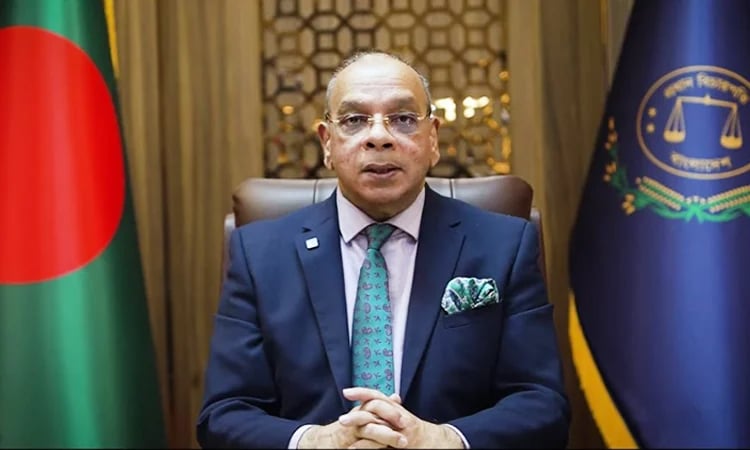
DHAKA, June 11, 2025 (BSS) - Chief Justice Dr Syed Refaat Ahmed has said his main goal is to establish an independent and efficient judiciary in the country to ensure fair and equal justice delivery for all.
“Our work to support fair and equal justice delivery, ensure access to justice for all and uphold the rule of law and human rights is more pertinent than ever,” he said in a video message presented at the opening session of the United Nations Development Programme’s 25th Annual Meeting on Rule of Law and Human Rights, held in New York of the United States (US) on Tuesday.
The annual meeting is being held from June 10-12 in New York where top judicial officials from different countries are participating.
In his speech the Chief Justice of Bangladesh called upon all to promote the rule of law and uphold human rights globally, regionally and nationally.
He said that the call to unite in promoting justice and human rights is enshrined at the very heart of the UN Charter as it is in Sustainable Development Goal 16. The 2024 Pact for the Future mandates to “strengthen efforts to build peaceful, just and inclusive societies for sustainable development, provide access to justice for all and build effective, accountable and inclusive institutions at all levels and uphold human rights and fundamental freedoms,” he mentioned.
Dr Syed Refaat Ahmed said there must be no doubt that the United Nations must reinforce and upscale their rule of law support as the fundament for peace, stability and prosperity.
“I call on you to support the mission regardless of historical and contemporary setbacks, despite competing priorities and in face of a sense that building robust and independent judiciaries is too daunting a task to even embark on,” he said.
“Our work in Bangladesh over the past nine months is a prime example of both, the centrality of rule of law reforms in countries in transitions, and of the UN’s – and in particular UNDP’s – ability to effectively support profound and far-reaching justice reforms with its broad and specialized expertise and its agility to scale up, deploy and tailor support as required for transformative change,” he said.
Mentioning the July-August 2024 revolution in Bangladesh, he said that the July-August 2024 revolution led to the ousting of the previous regime and the appointment of an interim government led by Nobel Laureate Prof Muhammad Yunus.
The student-led protests featured an unprecedented uprising of the youth against injustice, arbitrariness and oppression and a stark vindication of justice, he added.
“Since assuming office as Chief Justice of Bangladesh the legacies of those young men and women who paid the ultimate price in the protests guided my mission and hardened my resolve to restore equity and justice through a transformative agenda for judicial reform. The inherited backlog of more than 4.2 million cases and the deeply rooted distrust in a judiciary, crippled by ever growing political instrumentalization would not discourage me from taking immediate and resolute action,” he said.
“Rather, the fearless call for justice of those who took to the streets became my mandate to design a Reform Roadmap tailored to the needs of the people of Bangladesh, and responsive to their aspirations and vulnerabilities,”he added.
He said the UNDP has been supporting in its implementation with technical expertise including on alignment with international standards and norms and advice on integrity, digital transformation, people-centered approaches and outreach advice.
Together with a growing number of international partners, including the EU, the UK and Sweden, UNDP also supported the convening of country-wide judicial discussion on judicial independence, said the Chief Justice.
“Bangladesh must be an example of a transition towards a better future, our resolute pursuance of justice reform in volatile and challenging circumstances must remain a pillar of hope for all Bangladeshi men and women,” he said.
The promise of fundamental reforms towards a peaceful, stable, more equal and prosperous future is being kept, he said, adding, “When justice is absent, it will be vindicated on the streets. Reinstating justice leads us to peace, stability and the promotion of human rights”.
The Chief Justice expressed his gratefulness to the United Nations and in particular to UNDP country office, the regional hub and the global team for unwavering support in justice and human rights reforms.